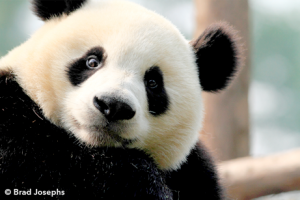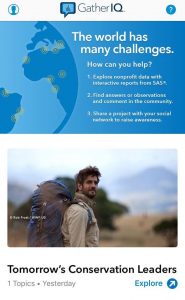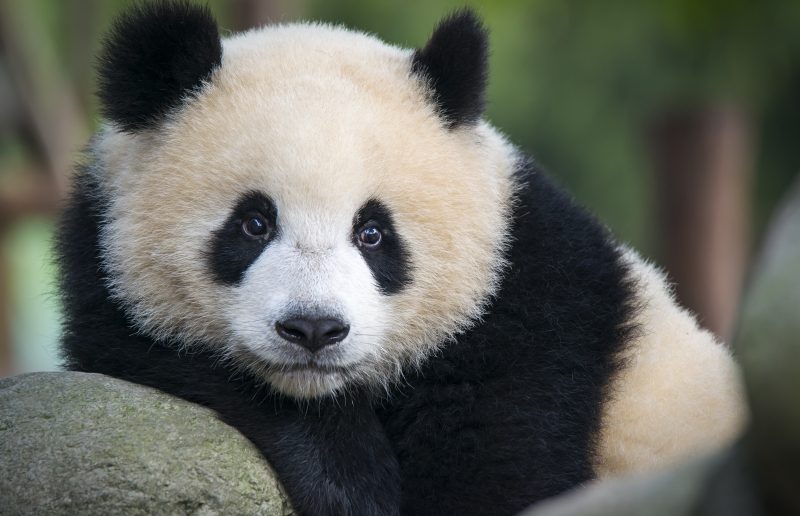World Wildlife Fund (WWF) invests in education and training to create the next generation of conservation leaders from around the world. These leaders go on to have a powerful influence on the fate of the world’s most biodiverse and vulnerable places.
While scores of leaders benefit from WWF’s support, many other individuals living in biologically rich places lack access to degree programs, courses and other learning opportunities that are crucial to developing knowledgeable stewards of the natural world.
Current data leads us to believe that too few learning opportunities are located in parts of the world where biological diversity is the highest. This means that conservation leaders from important places like the waterways of the Amazon, forests of Sumatra, savannahs of southern Africa, and shores of the Mesoamerican Reef have limited access to conservation educational resources.
 Right now, there is no comprehensive global dataset of learning opportunities for conservation. A new joint project with WWF and analytics provider SAS aims to cultivate tomorrow’s conservationists by providing a global dataset of degree, certificate and other educational conservation programs, from around the world.
Right now, there is no comprehensive global dataset of learning opportunities for conservation. A new joint project with WWF and analytics provider SAS aims to cultivate tomorrow’s conservationists by providing a global dataset of degree, certificate and other educational conservation programs, from around the world.
WWF and SAS seek to develop this list on topics as varied as marine biology and climate science to riparian ecology and wildlife conservation, but we can’t do it alone.
Harnessing the knowledge of the crowd
GatherIQ is a crowdsourcing effort from SAS that brings together thoughtful, concerned citizens to lend their intelligence, expertise, skills, and ingenuity to improve our understanding of global challenges.
While many GatherIQ projects will involve community members analyzing data, such as those about missing migrants, the WWF project seeks to gather data and information from the crowd.
If each individual provides information on a few learning opportunities, we can create a robust dataset to help guide tomorrow’s conservation leaders. Participants contribute by answering these questions:
- What institutions/colleges/universities offer academic programs in conservation?
- In what fields/disciplines do these programs specialize?
- What degrees or certificates do these programs offer?
Interested individuals can download GatherIQ from Apple’s App Store®. A webapp release will be coming soon with an Android version to follow.
A history of fostering local leadership
The GatherIQ and WWF project is the latest development in a long history of WWF efforts to generate and cultivate conservationists. Those efforts are bolstered by a large group of passionate people who want to help, but may not know how. WWF receives thousands of emails each year from individuals seeking advice on learning opportunities.
Started in 1994, to honor WWF Founder and Chairman Emeritus, Russell E. Train, WWF created the Russell E. Train Education for Nature Program to support the education and training of bright and passionate conservationists from across Africa, Asia, and Latin America to study anywhere in the world. Through a rigorous process, WWF identifies and supports leaders and organizations from WWF priority places who demonstrate an ongoing commitment to improving conservation in their home countries. These leaders then go on to make important contributions to conservation at home.
To date, WWF has provided nearly $20 million in financial support to build capacity of more than 1,900 individuals and funded 615 organizations to conduct training workshops, collectively reaching more than 55,000 community members, indigenous people, park guards, fishers, and others.
For 40 years, SAS has fostered local leadership by partnering with higher education institutions to create the analytics talent organizations need. Through this collaboration, SAS will help WWF identify the universities and other learning institutions that focus on conservation, ultimately helping to generate the talent it needs to protect our planet’s wildlife.
 Investing in education and training for local leaders empowers individuals and improves and accelerates conservation action. We need to connect the leaders of tomorrow with the opportunities of today.
Investing in education and training for local leaders empowers individuals and improves and accelerates conservation action. We need to connect the leaders of tomorrow with the opportunities of today.
Download the app to help us find tomorrow's conservation leaders today. Thank you for your help, and please spread the word about this #dataforgood initiative.


3 Comments
For more than half a century, WWF has worked to find innovative solutions that meet the needs of both people and nature. It’s a big job. And no one person or organization can do it alone. But together we can.
This is huge gap which has been existing. As an African youth, I have been looking forward to engage other organizations and youths in this sector.
There is an urgent to capacity build the communities and young people.
Enocka- thank you for joining the conversation. Yes, we agree that we need more people working toward a sustainable future. This project aims to understand the opportunities and gaps for conservation education around the world. Please do add any university or short term training programs that you know about to the GatherIQ app (on iPhone and coming soon to Android). Thanks you! Andrea